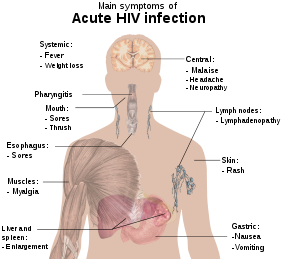Expressing. or having. symptoms

A symptom (from Greek σύμπτωμα, "accident, misfortune, that which befalls", from συμπίπτω, "I befall", from συν- "together, with" and πίπτω, "I fall") is a departure from normal function or feeling which is apparent to a patient, reflecting the presence of an unusual state, or of a disease. A symptom can be subjective or objective. Tiredness is a subjective symptom whereas cough or fever are objective symptoms. In contrast to a symptom, a sign is a clue to a disease elicited by an examiner or a doctor. For example, paresthesia is a symptom (only the person experiencing it can directly observe their own tingling feeling), whereas erythema is a sign (anyone can confirm that the skin is redder than usual). Symptoms and signs are often nonspecific, but often combinations of them are at least suggestive of certain diagnoses, helping to narrow down what may be wrong. In other cases they are specific even to the point of being pathognomonic.
The term is sometimes also applied to physiological states outside the context of disease, as for example when referring to "symptoms of pregnancy". Many people use the term sign and symptom interchangeably.
